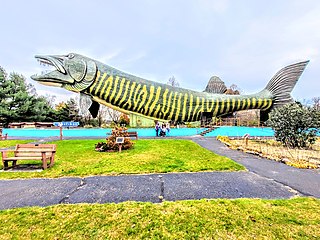Related Research Articles

Sawyer County is a county in the U.S. state of Wisconsin. As of the 2020 census, its population was 18,074. Its county seat is Hayward. The county partly overlaps with the reservation of the Lac Courte Oreilles Band of Lake Superior Chippewa Indians.
The American Indian Higher Education Consortium (AIHEC) was established in 1972 to represent the interests of the newly developed tribal colleges, which are controlled and operated by American Indian nations. The four founders were Gerald One Feather of the Oglala Sioux Community College, David Reisling of D–Q University, Pat Locke of the Western Interstate Commission for Higher Education (WICHE), and Helen Schierbeck of the United States Office of Education (USOE). They organized the initial meeting and brought together all who wanted to form such a national organization. One of the most significant achievements of AIHEC was to work with the United States Congress to authorize in 1994 land-grant status to 29 tribal colleges, achieved in October 1994 under the Elementary and Secondary Education Reauthorization Act.

Hayward is a city in Sawyer County, Wisconsin, United States, next to the Namekagon River. Its population was 2,533 at the 2020 census. It is the county seat of Sawyer County. The city is surrounded by the Town of Hayward. The City of Hayward was formally organized in 1883.

Fort Peck Community College (FPCC) is a public tribal land-grant community college in Poplar, Montana. The college is located on the Fort Peck Assiniboine & Sioux Reservation in the northeast corner of Montana, which encompasses over two million acres. The college also has a satellite campus in Wolf Point.

The Lac Courte Oreilles Tribe is one of six federally recognized bands of Ojibwe people located in present-day Wisconsin. It had 7,275 enrolled members as of 2010. The band is based at the Lac Courte Oreilles Indian Reservation in northwestern Wisconsin, which surrounds Lac Courte Oreilles. The main reservation's land is in west-central Sawyer County, but two small plots of off-reservation trust land are located in Rusk, Burnett, and Washburn counties. The reservation was established in 1854 by the second Treaty of La Pointe.
United Tribes Technical College (UTTC) is a private tribal land-grant community college in Bismarck, North Dakota. In 2012, UTTC had an enrollment 885 students, 635 full-time undergraduates, and 250 part-time undergraduates.

Salish Kootenai College (SKC) is a private tribal land-grant community college in Pablo, Montana. It serves the Bitterroot Salish, Kootenai, and Pend d'Oreilles tribes. SKC's main campus is on the Flathead Reservation. There are three satellite locations in eastern Washington state, in Colville, Spokane, and Wellpinit. Approximately 1,207 students attend SKC. Although enrollment is not limited to Native American students, SKC's primary function is to serve the needs of Native American people.

Northland College is a private college in Ashland, Wisconsin. It enrolls over 200 full-time undergraduates and employs 60 faculty members and 99 staff members. Northland College is accredited by the Higher Learning Commission.

Little Big Horn College is a public tribal land-grant community college on the Crow Indian Reservation in Crow Agency, Montana. It has an open admissions policy and welcomes enrollment from any adult with a high school diploma or GED. The student body is composed of Crow Tribal members, members of American Indian Tribes from around the intermountain west, and non-Indian residents of the Big Horn County area.

Bay Mills Community College (BMCC) is a public tribal land-grant community college in Brimley, Michigan. It is chartered by the federally recognized Bay Mills Indian Community of Michigan with a total enrollment of approximately 500 on-campus and online students. The students come primarily from Michigan's eastern Upper Peninsula and are 60% Native American. BMCC is a member of the American Indian Higher Education Consortium (AIHEC), a community of tribally and federally chartered institutions working to strengthen tribal nations, and a land-grant college.

Sisseton Wahpeton College (SWC) is a Public tribal land-grant four-year college of the Sisseton Wahpeton Oyate on the Lake Traverse Reservation in South Dakota. It was established in 1979 and serves the Dakota people and the general public. SWC has an average enrollment of about 250 students, of whom more than 80% are tribal members. It has both vocational and academic programs, which includes certificates, associate degrees and bachelor degrees as well as articulation arrangements with other universities/colleges so that students can transfer for continued studies.

Little Priest Tribal College is a public tribal land-grant community college in Winnebago, Nebraska. It is a member of the American Indian Higher Education Consortium and primarily supported by the Winnebago Tribe of Nebraska. It has an enrollment of 135 students, of which 90 percent are American Indian.
Nebraska Indian Community College (NICC) is a public tribal land-grant community college with three locations in Nebraska: Macy on the Omaha Tribe reservation, Santee on the Santee Sioux reservation, and the urban South Sioux City.
The Lake Superior Chippewa are a large number of Ojibwe (Anishinaabe) bands living around Lake Superior; this territory is considered part of northern Michigan, Wisconsin, and Minnesota in the United States. They migrated into the area by the seventeenth century, encroaching on the Eastern Dakota people who had historically occupied the area. The Ojibwe defeated the Eastern Dakota, who migrated west into the Great Plains after the final battle in 1745. While they share a common culture including the Anishinaabe language, this highly decentralized group of Ojibwe includes at least twelve independent bands in the region.

Chief Dull Knife College is a public tribal land-grant community college on the Northern Cheyenne Indian Reservation in Lame Deer, Montana. It is an open-admission college with about 141 students. On average, more than half of its graduates move on to four-year colleges.

Tribal colleges and universities (TCUs) are a category of higher education, minority-serving institutions in the United States defined in the Higher Education Act of 1965. Each qualifies for funding under the Tribally Controlled Colleges and Universities Assistance Act of 1978 or the Navajo Community College Act ; or is cited in section 532 of the Equity in Educational Land-Grant Status Act of 1994.
Fond du Lac Tribal and Community College (FDLTCC) is a public tribal land-grant community college in Cloquet, Minnesota. FDLTCC is located within the Twin Ports area of Duluth, Minnesota and Superior, Wisconsin in northeastern Minnesota. The college is a member of Minnesota State, the American Indian Higher Education Consortium, and the World Indigenous Nations Higher Education Consortium. FDLTCC was Minnesota's first tribal college. FDLTCC is the only college in the nation both established as a tribal college under federal law and operating as part of a state-funded higher education system.

Tohono Oʼodham Community College (TOCC) is a public tribal land-grant community college in Haivana Nakya, Arizona. As of fall 2023, TOCC's student body was 96 percent American Indian/Alaskan Native. Tohono Oʼodham Community College serves approximately 1174 students. As of 2012, the college's faculty and staff was 57 percent American Indian, half of whom were Oʼodham.
Waadookodaading Ojibwe Language Institute (Waadookodaading) is an Ojibwe-language immersion school located on the Lac Courte Oreilles Ojibwe Reservation in Hayward, Wisconsin.
References
- 1 2 3 4 "American Indian Higher Education Consortium". Archived from the original on June 14, 2012. Retrieved Mar 28, 2020.
- ↑ "NIFA 1994s The First 20 Years of the 1994 Land-Grant Institutions Standing on Tradition, Embracing the Future" (PDF). National Institute of Food and Agriculture. September 25, 2015. Retrieved December 20, 2020.
- 1 2 Mitchell, Paul (2018-06-23). "LCO college names new president". APG of Wisconsin. Retrieved 2024-08-11.